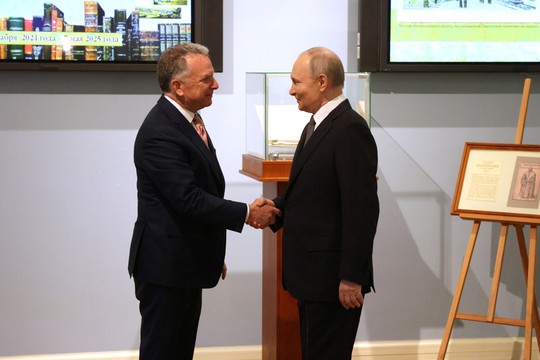Vladimir Putin met US Special Envoy Steve Witkoff.
Photo: Kremlin.ru
The President of Russia held a meeting with Steve Witkoff, Special Envoy of the President of the United States of America. The meeting is focused on the aspects of the Ukraine crisis settlement, Kremlin informs.
Kremlin Spokesman Dmitry Peskov told reporters on Friday that Putin and Witkoff had begun their meeting at the presidential library building in St. Petersburg. According to Peskov, "various aspects of the Ukrainian settlement" are being discussed. Among other things, the Kremlin expects it to be an opportunity to convey "the main elements of Russia's position, Russia's main concerns" to Trump.
The Washington administration considers US presidential special envoy Steve Witkoff's trip to Russia and his meeting with Russian leader Vladimir Putin as another step towards a ceasefire and a final settlement in Ukraine, White House Press Secretary Karoline Leavitt told reporters, TASS reports from Washington.
"I can confirm that Mr. Witkoff is in Russia to have direct communications with the Kremlin and with Vladimir Putin. This is another step in the negotiating process towards a ceasefire and ultimate peace deal in Russia and Ukraine," she said. The spokeswoman did not provide additional details about these contacts. "As these negotiations are ongoing, I obviously will not get ahead of [US] President [Donald Trump] or his team," she pointed out. "The president is determined to see this through," the spokeswoman emphasized, referring to the Ukrainian settlement.
The fastest way to broker a ceasefire in Ukraine, said Witkoff, was to support a strategy that would give Russia ownership of four eastern Ukrainian regions it attempted to annex illegally in 2022, two U.S. officials and five people familiar with the situation told Reuters.
It was a point Witkoff had made previously – and publicly in a podcast interview with conservative media personality Tucker Carlson last month – but one that Kyiv has repeatedly rejected and that some U.S. and European officials have dismissed as a maximalist Russian demand.
In the meeting with Trump, General Keith Kellogg, the president’s Ukraine envoy, pushed back against Witkoff, saying Ukraine, though willing to negotiate some terms related to disputed land, would never agree to unilaterally cede total ownership of the territories to Russia, said two of the sources.
Trump administration officials are increasingly at odds over how to break the deadlock between Ukraine and Russia, with Witkoff and Kellogg - who favors more direct support for Ukraine - disagreeing on the best course forward, according to the U.S. officials and people familiar with the matter and four Western diplomats who are in touch with administration officials.
Witkoff, an old friend of Trump's who has helped secure key diplomatic victories for the president, has garnered some support from the Republican Party's Ukraine skeptics but his proposals have stoked outrage among other Republicans who believe the administration has turned too sharply toward Moscow.
Some Republicans on Capitol Hill were so concerned about Witkoff's apparent pro-Russia stance in the Carlson interview that several called National Security Adviser Mike Waltz and Secretary of State Marco Rubio afterward to complain, according to a person familiar with the calls.
Witkoff first publicly floated the idea of handing over to Russia the four Ukrainian regions - Luhansk, Donetsk, Zaporizhzhia and Kherson - in the March 21 interview with Carlson.
“They’re Russian-speaking,” he said of the eastern territories. “There have been referendums where the overwhelming majority of the people have indicated that they want to be under Russian rule.”
Witkoff’s comments shocked many U.S. national security officials.
Just a few days after the Carlson interview, the Wall Street Journal, owned by Rupert Murdoch's News Corp, published an op-ed titled “Steve Witkoff Takes the Kremlin’s Side.”
Witkoff has plenty of defenders within the administration, who say he has been unfairly maligned by foreign policy officials who hold hawkish views in a Republican Party that has increasingly renounced foreign intervention. Witkoff and Trump still maintain a strong personal relationship, according to multiple people familiar with their relationship.
“Special Envoy Witkoff has brought a wealth of private sector negotiating experience and urgency to the diplomatic stage and we’re already seeing results in just a few weeks,” National Security Adviser Mike Waltz told the Hill in a statement.
Despite frequent conversations between Witkoff and Kellogg, the administration has not established a coordinated Ukraine policy process. Contrary to standard practice, the National Security Council has hosted only one principals' meeting - a meeting that includes all or most of the president's top national security advisers - on the issue, a person familiar with the matter said, leading to greater confusion inside the administration and among allies in Europe about the direction of the peace talks.
Two senior Western diplomats who are in touch with the administration said they believe Washington lacks a “clear plan” on how to move forward and what to do if Russia continues to delay.
“We sometimes hear contradictory things from different parts of the administration," one of the diplomats, speaking on the condition of anonymity, said. "That also adds to the sense that there is no real plan here.”
read more in our Telegram-channel https://t.me/The_International_Affairs

 13:55 12.04.2025 •
13:55 12.04.2025 •























